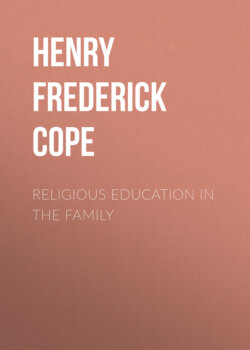Читать книгу Religious Education in the Family - Henry Frederick Cope - Страница 6
На сайте Литреса книга снята с продажи.
§ 2. THE RELIGIOUS MOTIVE
ОглавлениеThe family needs a religious motive. More potent for happiness than courses in domestic economy will be training in sufficient domestic motives. It will take much more than modern conveniences, bigger apartments, or even better kitchens to make the new home. Essentially the problem is not one of mechanics but of persons. What we call the home problem is more truly a family problem. It centers in persons; the solution awaits a race with new ideals, educated to live as more than dust, for more than dirt, for personality rather than for possessions. We need young people who establish homes, not simply because they feel miserable when separated, nor because one needs a place in which to board and the other needs a boarder, but because the largest duty and joy of life is to enrich the world with other lives and to give themselves in high love to making those other lives of the greatest possible worth to the world.
The family must come to a recognition of social obligations. We all hope for the coming ideal day. Everywhere men and women are answering to higher ideals of life. But the new day waits for a new race. Modern emphasis on the child is a part of present reaction from materialism. New social ideals are personal. We seek a better world for the sake of a higher race. The emphasis on child-welfare has a social rather than a sentimental basis. The family is our great chance to determine childhood and so to make the future. The child of today is basic to the social welfare of tomorrow. He is our chance to pay to tomorrow all that we owe to yesterday. The family as the child's life-school is thus central to every social program and problem.
